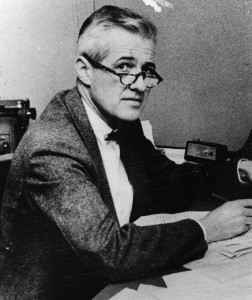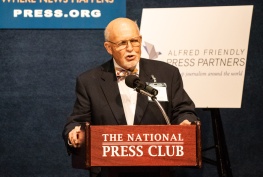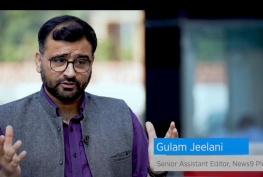 Alfred Friendly’s extraordinary professional life is getting new recognition in the wake of the Steven Spielberg movie “The Post.”
Alfred Friendly’s extraordinary professional life is getting new recognition in the wake of the Steven Spielberg movie “The Post.”
The film nominated for two Oscars hit theaters nationwide in January, and generations of moviegoers learned or were reminded of a legal battle over the publication of the Pentagon Papers, classified documents about the Vietnam War that rocked the 70’s.
Friendly, who was managing editor of The Washington Post for a decade, is mentioned only once, but the name-dropping has stirred up new awareness of the Pulitzer Prize-winning newspaperman.
“She got rid of Al Friendly,” a character says in reference to publisher Katharine Graham’s decision in 1965 to ease out the paper’s top editor to make way for Ben Bradlee. For those who knew Al Friendly, the line may make them cringe.
But John Kelly’s January 16 column in The Washington Post, the story behind the story, reignited discussion of Friendly’s impact on modern American journalism.
“Steven Spielberg’s movie, like this newspaper, is full of interesting characters, but one of the most interesting doesn’t appear on screen,” Kelly writes.
Alfred Friendly is credited with elevating the Post from a local newspaper to a national icon. He began his career there as a reporter in 1939 and was managing editor from 1955 to 1965 before becoming a foreign correspondent for the paper.
This year marks the 50th anniversary of Friendly’s 1968 Pulitzer Prize, awarded for his coverage of the Six-Day War in the Middle East. His reporting excelled at highlighting some of the most important international events of the time, including the first eye-witness report of Israeli fighting on the Syrian front and articles that revealed Soviet military participation.
Kelly’s interview with Al Friendly’s second son, Jonathan, a former reporter for The New York Times, highlights his father’s successful post-Post career.
“It wasn’t the end of life for him,” Jonathan told Kelly.
After leaving the newspaper, Friendly became an advocate for journalism education. He worked as a columnist and as the communications director for the Marshall Plan, and eventually, of course, founded Alfred Friendly Press Partners, an organization that has dedicated 34 years to serving his mission of uplifting journalism across the world.
A slight correction has been made to John Kelly’s column. In a letter to the editor, David Sherman clarifies Friendly’s role in the famed Bletchley Park code-breaking project during World War II. Friendly was not involved personally in the Britain-based code-breaking efforts or overseeing them. As Sherman explains, Friendly actually worked as a U.S. Army intelligence officer, converting the raw decrypts of German Enigma traffic into information that could be used by Allied commanders at the front. Friendly’s book, “Confessions of a Code Breaker,” reflected on his time at Bletchley.
Friendly’s commitment to international journalism inspired Frank Islam and Debbie Driesman, founders of the Frank Islam and Debbie Driesman Foundation, to sponsor an Alfred Friendly fellow in 2017 and again this year.
“We should all be grateful that Alfred Friendly’s philanthropic vision continues to help journalists from emerging democracies experience the dedication and the essential importance of the free press so well portrayed in ‘The Post,’” Islam wrote to the newspaper in a letter to the editor.
Fifteen years after receiving his Pulitzer Prize, Al Friendly would sit on Maryland’s Eastern Shore waiting for geese to come into range and chatting with his son, Jonathan, about his desire to “do something” for the profession that had been so good to him. Widely traveled and deeply interested in the world outside of the United States, Friendly pondered the failure of the Western press to offer a helping hand to journalists in nations emerging from colonialism.
He created a unique program centered on training journalists in U.S. newsrooms, a direct professional-to-professional experience that didn’t depend on governments or other outside agencies. His legacy remains strong through Press Partners’ commitment to supporting and training journalists from Russia to South Africa, from the Philippines to Mexico, and scores of countries in between.While some believe his legacy at The Post was overshadowed by the legal battle that followed, we still think his life story would make a great movie. Who would you cast as the lead?
By Rachel Foster-Gimbel and David Reed




